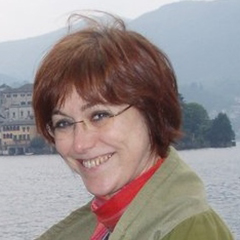Afferenza
Ricevimento e Altre Informazioni
La prof.ssa Bertone riceve in entrambe le sedi del Dipartimento, ad Alessandria presso il suo ufficio e ad Asti presso la sede del Corso di Laurea in Servizio Sociale, su appuntamento mail (scrivendo a chiara.bertone@uniupo.it)
Didattica
CV
Pubblicazioni
Ricerca
Brave New Women. Pratiche e aspirazioni di solidarietà femminile nella mezza età. Le donne della
generazione di mezzo sono un anello forte del sistema di welfare
italiano, fondamentale per la cura di grandi anziani e nipoti e delle
relazioni familiari e comunitarie, ma rischiano di diventarne un anello
debole, tra crescenti sovraccarichi di cura e precarietà economica. Il
progetto si propone di identificare pratiche e aspirazioni relative alla
ricostruzione di reti di sostentamento e cura da parte di donne tra i
55 e i 70 anni, che non vivono in coppia, e di delinearne le possibili
forme di tutela giuridica e di traduzione in azioni di policy. Attraverso l’approccio partecipato, il progetto vuole ridefinire
insieme alle donne coinvolte i significati e gli obiettivi di modelli di
condivisione e mutua assistenza che rispondano alle proprie aspirazioni. Sito del progetto: http://www.medeacontroviolenza.it/home_progetto/
Queerying families of origin. The research
aims to explore how families of origin of Gay, Lesbian, Bisexual and
Transgender (GLBT) people are involved in negotiating meanings and experiences
of sexuality and intimacy, an underexplored dimension of queer family life.
Delving into the perspectives of families of origin and showing the complexity
and heterogeneity of the ways people with their different gender and sexual
identities "do" families across generations, it contributes to
querying the very distinction between families of origin and families of
choice, and questions the (hetero)normative assumptions about forms and
boundaries of family this distinction rests upon. A focus on marginal contexts,
such as Southern Europe, and on marginal subjects, like bisexuals or black
lesbians, is proposed as a way to challenge the universality of privileged
narratives within heteronormativity, homonormativity and anglocentrism.
Queerying families of origin. The research
aims to explore how families of origin of Gay, Lesbian, Bisexual and
Transgender (GLBT) people are involved in negotiating meanings and experiences
of sexuality and intimacy, an underexplored dimension of queer family life.
Delving into the perspectives of families of origin and showing the complexity
and heterogeneity of the ways people with their different gender and sexual
identities "do" families across generations, it contributes to
querying the very distinction between families of origin and families of choice,
and questions the (hetero)normative assumptions about forms and boundaries of
family this distinction rests upon. A focus on marginal contexts, such as
Southern Europe, and on marginal subjects, like bisexuals or black lesbians, is
proposed as a way to challenge the universality of privileged narratives within
heteronormativity, homonormativity and anglocentrism, and to reveal unexpected
resources families of origin mobilise to make sense of GLBT identities and
lived experiences.

